Huawei Certification Exam Requirements and Levels
Update time:2025-09-09
Many newcomers to the ICT industry often ask: “What are the levels of Huawei certification?What are the requirements?Can beginners skip straight to intermediate?”
Here’s a detailed breakdown of the three-level Huawei certification system, the exam requirements, and study strategies, to help you plan your learning path.

1.The Three-Level Huawei Certification System

HCIA (Associate – Entry Level)
Positioning: Basic operations certification.Candidates should understand device configurations and perform entry-level tasks.
Skills: Core ICT concepts such as IP addressing and routing protocols (Datacom), or virtualization principles (Cloud).
Target Audience: Beginners, career changers, or students.Proof of basic ICT knowledge.

HCIP (Professional – Intermediate Level)
Positioning: Independent deployment certification.Candidates should be able to design and implement small-to-medium scale networks/systems.
Skills: Advanced scenario technologies such as routing policies, redundancy, and firewall rules.
Demand: Widely required for enterprise operations and implementation roles.

HCIE (Expert – Advanced Level)
Positioning: Architecture-level certification.Candidates should design large-scale networks from scratch and solve complex issues.
Skills: End-to-end design, hybrid cloud deployment, advanced troubleshooting.
Market Value: Fewer than 100,000 certified in China.Highly valued in finance and government sectors.

2.Exam Requirements: Open to All, but Skills Matter
HCIA (Entry Level)
Requirements: Age 18+, valid ID (passport/ID card).No education or work experience required.
Exam: 90-min written, multiple-choice/true-false, pass mark: 600/1000.

HCIP (Intermediate Level)
Requirements: Same as HCIA.No mandatory HCIA prerequisite, but recommended to have HCIA knowledge and 1–3 years of work experience.
Exam: Two written tests (varies by track), same scoring rules.Valid for 18 months.

HCIE (Advanced Level)
Requirements: Same as HCIA.No mandatory HCIP prerequisite, but 3–5 years ICT experience recommended.
Exam: Written → 8-hour lab → certificate.Lab includes solution design, configuration, and troubleshooting.

3.Popular Certification Tracks

Datacom (Routing & Switching): Classic entry-level track;routing, switching, SDN.Most versatile, highest demand.
Cloud Computing: High-demand, high-paying track;virtualization, containers, cloud platforms.Salaries 25–40% higher than traditional network roles.
Network Security: Policy-driven;firewall, intrusion prevention.Strong demand in finance and government sectors.
Other Tracks (Storage/WLAN, etc.): More niche, smaller demand, but less competition.
4.Study Strategies: Step-by-Step
HCIA (2–3 Months)
Focus: TCP/IP basics, OSI layers, small LAN configuration.
Tools: Huawei Talent Online free MOOC, official docs.
Focus: Scenario-based configs (e.g., routing policies, NAT, VPN).
Practice: Build labs based on real projects to validate solutions.
Focus: 8-hour lab exam—solution design, configuration, validation, troubleshooting.
Skills: Detect routing loops, ACL misconfigs, disaster recovery.
The Huawei certification path provides ICT professionals with a clear roadmap:
Start with HCIA (entry-level).
Progress to HCIP (2–3 years of experience).
Challenge HCIE (expert-level).
Direction recommendations:
Datacom / Cloud = best for most people.
Security = strong salary premium.
Certificates validate your skills, but real competitiveness comes from problem-solving ability.With the right dumps, you can focus on high-frequency exam points, shorten prep time, and greatly improve your passing confidence.
I'm your man who have the 100% valid dumps , buy it now for 50% off to clear your exam!
Click it ↓↓
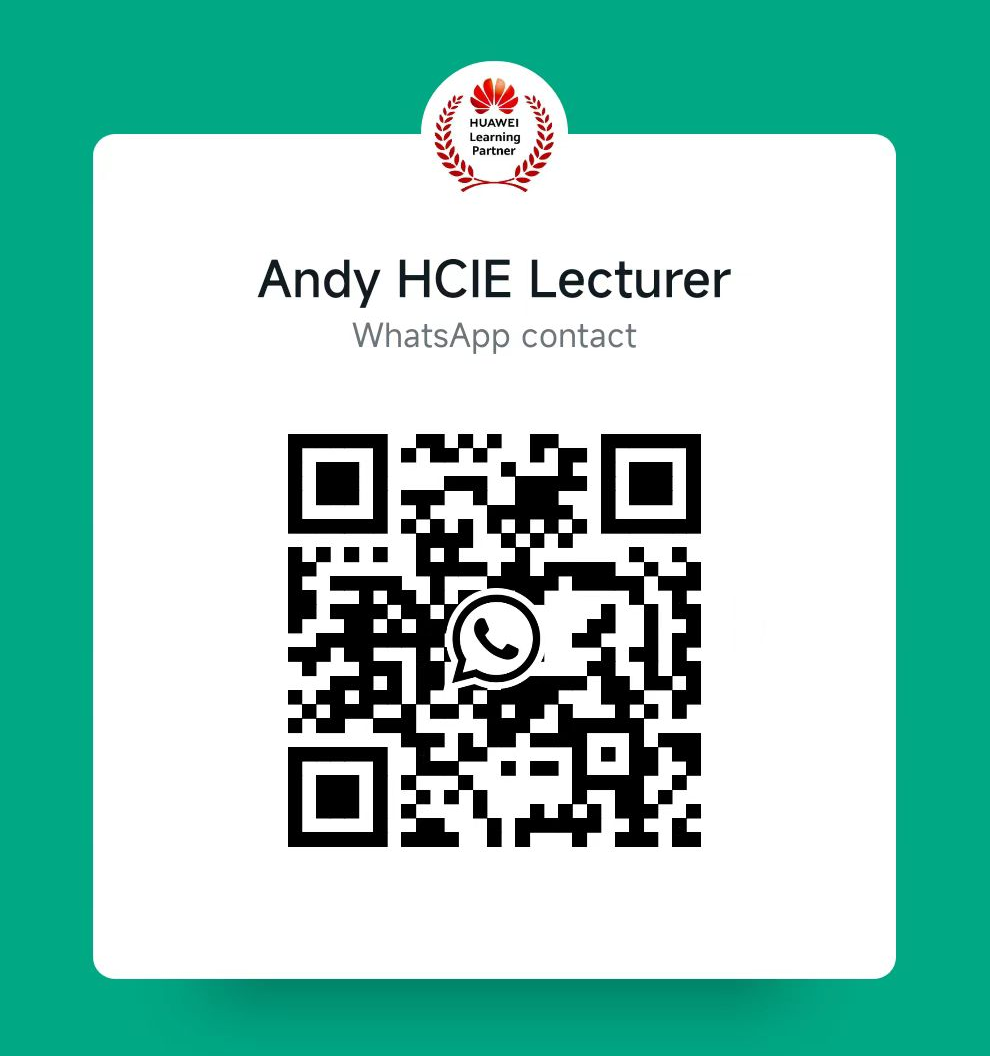
Here’s a detailed breakdown of the three-level Huawei certification system, the exam requirements, and study strategies, to help you plan your learning path.

1.The Three-Level Huawei Certification System
HCIA (Associate – Entry Level)
Positioning: Basic operations certification.Candidates should understand device configurations and perform entry-level tasks.
Skills: Core ICT concepts such as IP addressing and routing protocols (Datacom), or virtualization principles (Cloud).
Target Audience: Beginners, career changers, or students.Proof of basic ICT knowledge.
HCIP (Professional – Intermediate Level)
Positioning: Independent deployment certification.Candidates should be able to design and implement small-to-medium scale networks/systems.
Skills: Advanced scenario technologies such as routing policies, redundancy, and firewall rules.
Demand: Widely required for enterprise operations and implementation roles.
HCIE (Expert – Advanced Level)
Positioning: Architecture-level certification.Candidates should design large-scale networks from scratch and solve complex issues.
Skills: End-to-end design, hybrid cloud deployment, advanced troubleshooting.
Market Value: Fewer than 100,000 certified in China.Highly valued in finance and government sectors.
2.Exam Requirements: Open to All, but Skills Matter
HCIA (Entry Level)
Requirements: Age 18+, valid ID (passport/ID card).No education or work experience required.
Exam: 90-min written, multiple-choice/true-false, pass mark: 600/1000.
HCIP (Intermediate Level)
Requirements: Same as HCIA.No mandatory HCIA prerequisite, but recommended to have HCIA knowledge and 1–3 years of work experience.
Exam: Two written tests (varies by track), same scoring rules.Valid for 18 months.
HCIE (Advanced Level)
Requirements: Same as HCIA.No mandatory HCIP prerequisite, but 3–5 years ICT experience recommended.
Exam: Written → 8-hour lab → certificate.Lab includes solution design, configuration, and troubleshooting.
3.Popular Certification Tracks
Datacom (Routing & Switching): Classic entry-level track;routing, switching, SDN.Most versatile, highest demand.
Cloud Computing: High-demand, high-paying track;virtualization, containers, cloud platforms.Salaries 25–40% higher than traditional network roles.
Network Security: Policy-driven;firewall, intrusion prevention.Strong demand in finance and government sectors.
Other Tracks (Storage/WLAN, etc.): More niche, smaller demand, but less competition.
4.Study Strategies: Step-by-Step
HCIA (2–3 Months)
Focus: TCP/IP basics, OSI layers, small LAN configuration.
Tools: Huawei Talent Online free MOOC, official docs.
Exam Prep: Use HCIA dumps to master common topics, and practice with simulators (eNSP for Datacom).
HCIP (3–6 Months)Focus: Scenario-based configs (e.g., routing policies, NAT, VPN).
Practice: Build labs based on real projects to validate solutions.
Exam Prep: Use HCIP real-exam dumps to cover clustering, firewall, and enterprise network deployment.
HCIE (6–12 Months)Focus: 8-hour lab exam—solution design, configuration, validation, troubleshooting.
Skills: Detect routing loops, ACL misconfigs, disaster recovery.
Exam Prep: Use HCIE mock dumps to repeatedly simulate exam conditions and boost pass rates.
Summary: Level Up Step by StepThe Huawei certification path provides ICT professionals with a clear roadmap:
Start with HCIA (entry-level).
Progress to HCIP (2–3 years of experience).
Challenge HCIE (expert-level).
Direction recommendations:
Datacom / Cloud = best for most people.
Security = strong salary premium.
Certificates validate your skills, but real competitiveness comes from problem-solving ability.With the right dumps, you can focus on high-frequency exam points, shorten prep time, and greatly improve your passing confidence.
I'm your man who have the 100% valid dumps , buy it now for 50% off to clear your exam!
Click it ↓↓

Hot article
-
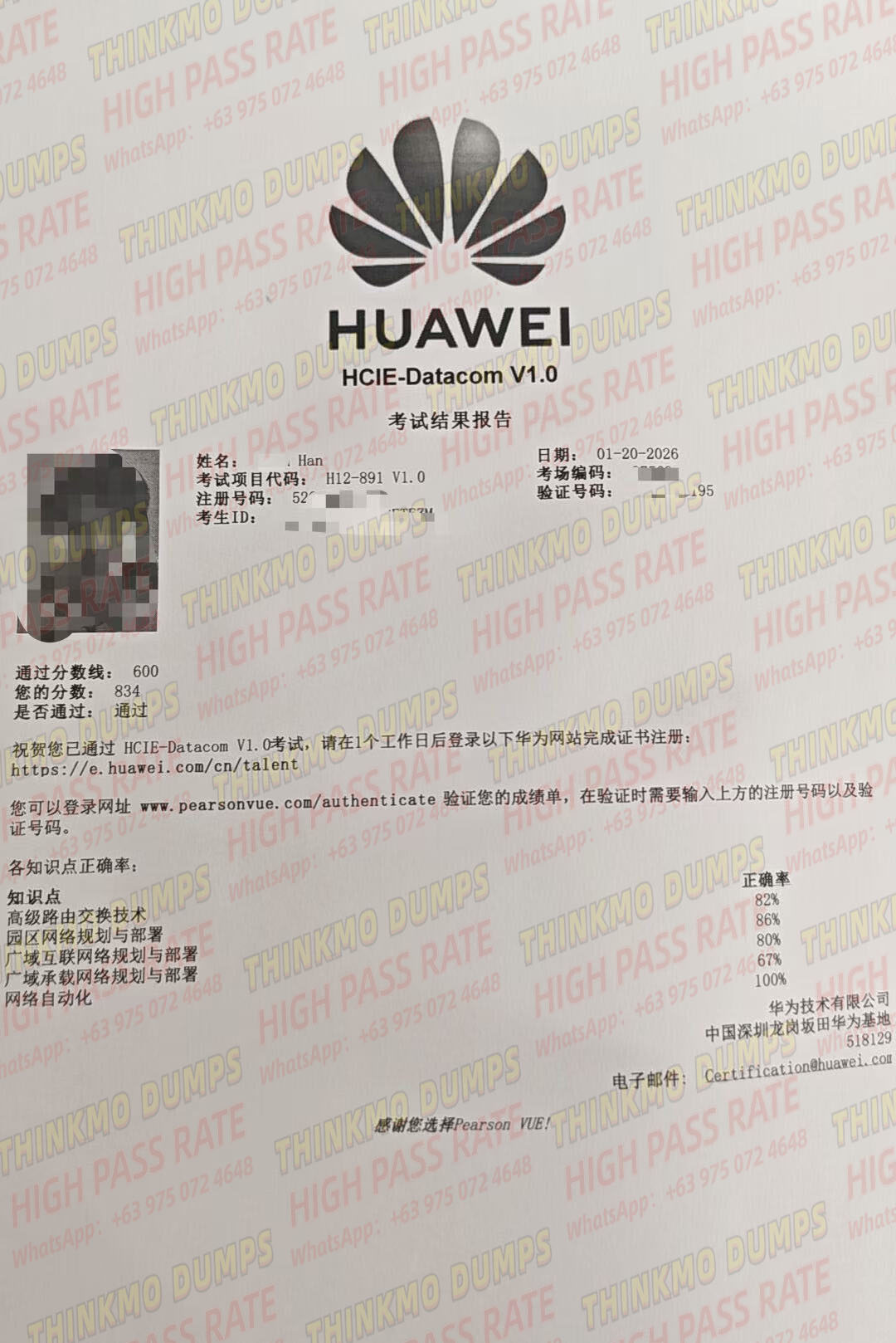 1
1 1. ThinkMo Precise Question Bank: Ace HCIE Written
上传:2026-01-23
-
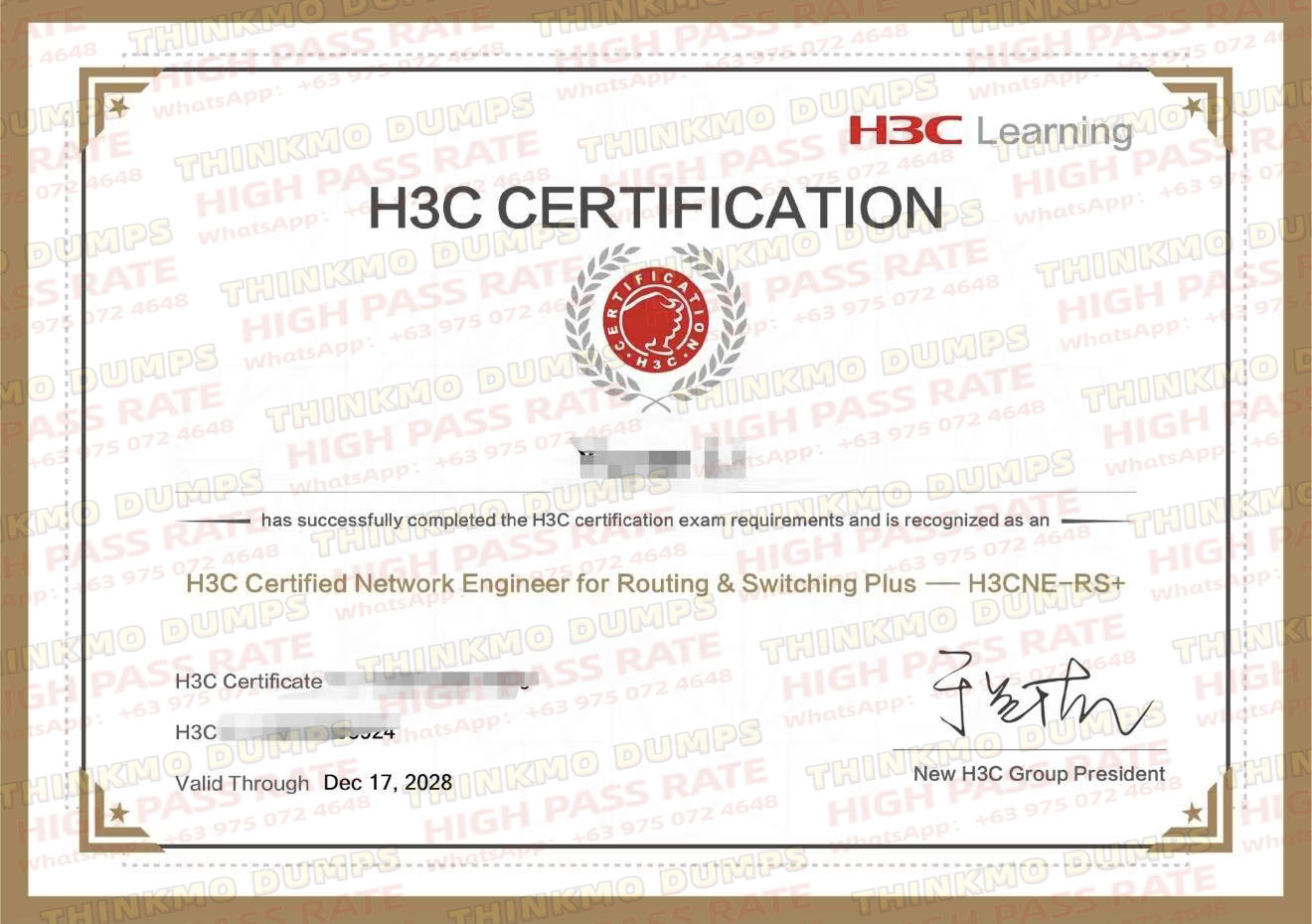 2
2 Triple H3CNE/H3CSE Passes | ThinkMo Christmas Succe
上传:2025-12-25
-
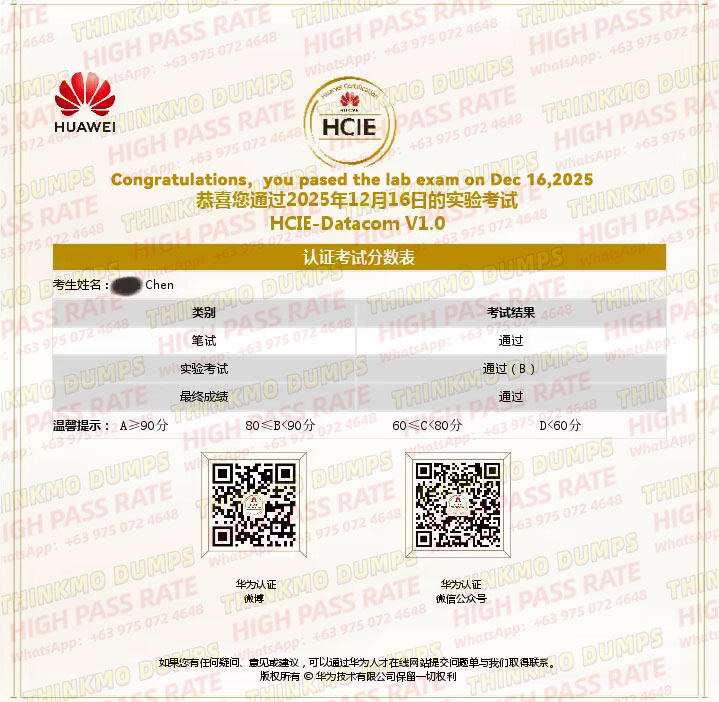 3
3 Success Streak: ThinkMo’s Dec HCIE-Datacom Win
上传:2025-12-24
-
 4
4 ThinkMo Guide: Cisco & Huawei Certification Com
上传:2025-12-22
-
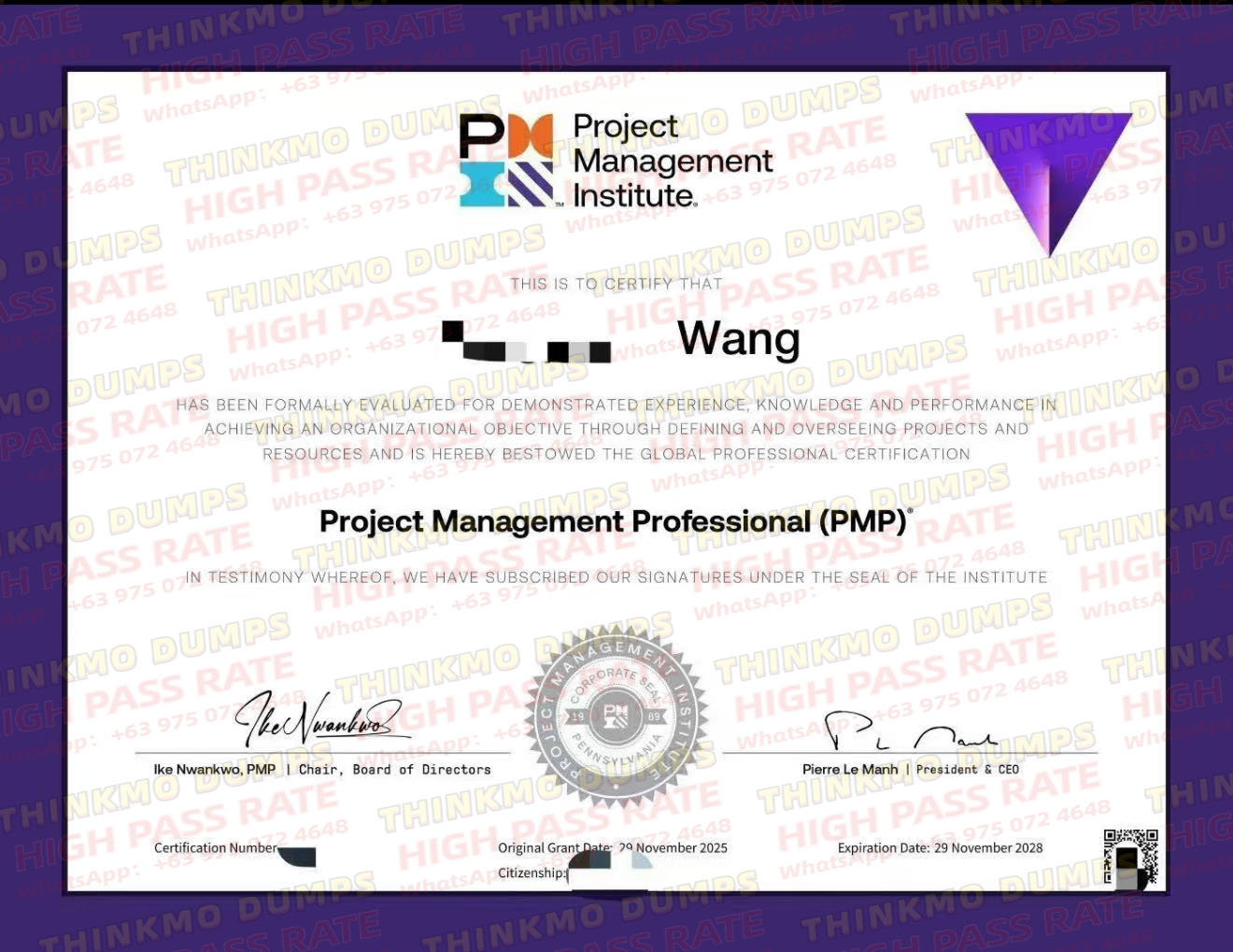 5
5 Pass CCIE/CKA Exams with ThinkMo’s Top Question B
上传:2025-12-19








